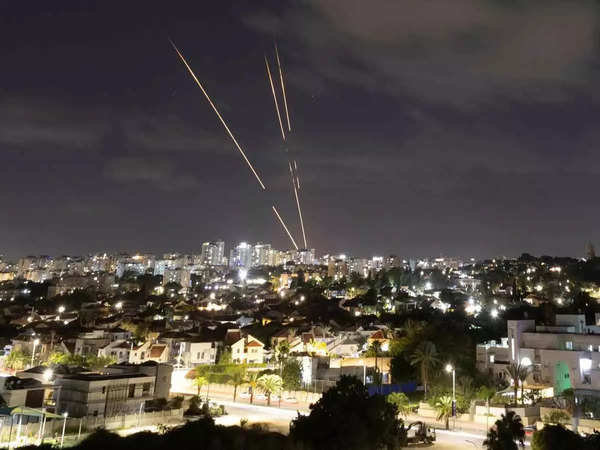
In a significant escalation of tensions in the Middle East, Iran launched a series of ballistic missiles at Israel, marking a turning point in the volatile relations between the two countries. The attack has sent shockwaves across the region and the international community, with fears of a wider conflict looming. Tehran’s justification for the assault, described as both “legal” and “rational,” further heightens the stakes in an already delicate geopolitical environment.
The Strike: A ‘Legitimate Response’
According to a statement released by Iran’s mission to the United Nations, the missile strikes were a direct and justified response to what it called “terrorist acts” perpetrated by Israel. The statement, posted on X (formerly Twitter), emphasized that Iran’s actions were both “legal” and “rational” in the face of what Tehran views as Israeli aggression.
“Iran’s actions are a legitimate response to the Zionist regime’s recent hostilities,” read the post. “Should the Zionist regime dare to respond or commit further acts of malevolence, a subsequent and crushing response will ensue.”
The mission also sent a stark warning to other regional states and countries supporting Israel, urging them to reconsider their alliances: “Regional states and the Zionists’ supporters are advised to part ways with the regime.”
This rhetoric underscores the gravity of the situation and signals Iran’s willingness to escalate further if provoked. Tehran’s use of social media to broadcast its official stance on the attack also reflects a modern strategy in wartime communications, seeking to sway both domestic and international opinion.
Tensions Reach Boiling Point
The missile strikes come amid an already heightened state of tensions between Iran and Israel, two arch-enemies who have frequently clashed through proxy forces across the region. While direct confrontations have been rare, the two countries have engaged in cyberattacks, military strikes on third-party territories, and heated exchanges in diplomatic circles.
Analysts suggest that the missile barrage could be a prelude to a broader conflict, particularly if Israel decides to retaliate. “This could be the tipping point that takes the Middle East from a cold war to an all-out conflict,” said a Middle East expert based in Washington, D.C. “The risk of regional powers being drawn into this, particularly Gulf states and even the United States, is substantial.”
The potential for a broader confrontation is evident in the words of Iran’s UN mission, which left no room for misinterpretation in its warning to Israel and its allies. Tehran appears prepared for a tit-for-tat escalation, which could draw in other regional actors like Hezbollah in Lebanon, or even Russia and the United States, who have interests in the region.
Israel’s Response: Silence or Retaliation?
At the time of writing, Israel has yet to issue an official response to the missile strikes, but a military retaliation is widely anticipated. Israeli Prime Minister Benjamin Netanyahu has previously vowed to take decisive action against any attack on Israeli soil. However, the Israeli government now faces a difficult decision: retaliate and risk a full-scale war, or seek diplomatic channels to de-escalate the crisis.
Israel’s options are complicated by the nature of its regional alliances. While it has strong ties with the United States, Europe, and some Gulf nations, an overt military response could unravel fragile coalitions in the Middle East. Iran’s warning to other regional states to distance themselves from Israel adds further complexity to an already intricate web of relationships.
Should Israel choose to strike back, it could target Iranian military assets, facilities tied to the Islamic Revolutionary Guard Corps, or Iran’s nuclear infrastructure. However, such an action would likely provoke a broader conflict, possibly drawing in groups like Hezbollah and Hamas, both of which have previously supported Iran in conflicts with Israel.
Global Reactions and the Risk of Broader Conflict
The international community is keeping a close eye on the unfolding situation. Several countries, including the United States, Russia, and European powers, have expressed deep concern over the potential for further escalation. The United Nations has called for calm and has encouraged both nations to pursue diplomatic solutions to avoid further bloodshed.
“This is a critical moment for regional and global security,” stated a UN spokesperson in New York. “We urge both parties to de-escalate immediately and refrain from actions that could exacerbate the situation.”
Meanwhile, the conflict has already started affecting global markets. Oil prices have spiked by 5% in the immediate aftermath of the attack, with analysts warning that a prolonged conflict could lead to a more significant disruption in the global energy supply. The oil markets are particularly vulnerable given the region’s status as a major producer, and any sustained conflict could trigger a global energy crisis.
A Fragile Peace in Peril
As tensions between Iran and Israel reach a critical point, the risk of a broader Middle East conflict appears imminent. The missile strike could be a turning point in the long-standing hostilities between the two nations, and with both sides showing little willingness to back down, the situation remains precarious.
Diplomatic efforts to de-escalate the crisis will likely intensify in the coming days, with the United Nations, the United States, and other global powers expected to step in. However, given the entrenched animosities and the uncompromising rhetoric from both sides, a peaceful resolution seems distant.
The world now watches as the conflict teeters on the edge of all-out war, and the next few days will be critical in determining whether the region plunges into deeper turmoil or finds a way to pull back from the brink. For now, the Middle East holds its breath.
